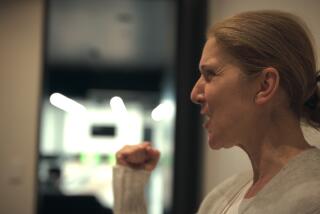‘Hope’ Inspired by Surgeon With Tourette’s
- Share via
Morton Doran says he didn’t discover he had the neurological disorder Tourette’s syndrome until he was 37; by then, Doran, a general surgeon practicing in northwest Canada, was living a double life. At home, with his wife and children, he displayed the symptoms of full-blown Tourette’s--motor tics, obsessive-compulsive rituals and uncontrolled, expletive-laden outbursts known as coprolalia.
But in the operating room, hovering over a patient, a different person emerged, one with a focused gaze and steady hands.
The striking dichotomy in Doran’s personal and professional life prompted neurologist and writer Dr. Oliver Sacks to include Doran’s story in his 1995 book “An Anthropologist on Mars.” Now Doran’s story visits the small screen, in tonight’s episode of the CBS medical drama “Chicago Hope” at 10 p.m.
“When I’m operating I’m absolutely rock-steady,” says Doran, now 59 and still practicing in British Columbia. “But it’s not that I have no tics. When you’re operating, you might dissect and cut something. And then, what I do is, I’ll just stand back for a second and then I’ll go back and work again.”
Though not exactly the model for the episode of “Chicago Hope,” the show, written by consulting producer Marjorie David, does use Sacks’ story as the leaping-off point for an episode in which a young couple must decide whether to allow a heart surgeon with Tourette’s to perform a radical procedure on their newborn baby. It’s a decision made more problematic by the doctor, played by Rene Auberjonois, who alternately reassures the couple about the surgery and horrifies them by blurting out “Dead duck!” “Dead duck!”--a verbal tic that Doran sweepingly calls “disinhibition.”
A neurological disorder caused by a chemical imbalance in the brain, Tourette’s syndrome has made brief appearances in the public consciousness--the subject of an acclaimed documentary (“Twitch and Shout”), a recent independent movie (“Niagara, Niagara”) and the real-life backstory of two professional athletes, former baseball player Jim Eisenreich and current NBA guard Mahmoud Abdul-Rauf.
Television has tackled Tourette’s, typically using the more gaudy symptoms as a window onto the disorder, though this time the setting is a hospital where even the staff grapples with the spectacle of Auberjonois’ Dr. Walter Kerry.
“[The episode] was well done,” says Doran, in Los Angeles this week to speak before the Tourette’s Syndrome Assn. “It was a little strong, but I guess that’s Hollywood. There was nothing that was unrealistic or phony.”
For former “Chicago Hope” producer Jeffrey Kramer, who consulted with David on the episode, Tourette’s syndrome is all too real. Not only has Kramer lived with it all his life, but two of his sons, 16-year-old Jordan and 12-year-old Jackson, have Tourette’s as well.
“Growing up, I just thought I was weird,” says Kramer, whose symptoms included head tics and obsessive-compulsive behaviors. Still, the motor and verbal tics exhibited by Kramer and his children are nowhere near as pronounced as the behaviors of Kerry. To be sure, while depictions of Tourette’s on TV and in films have by dramatic impulse highlighted the most eye-catching and disturbing manifestations of the syndrome, many with TS learn to cope with far less obtrusive symptoms, including mild tics and attention deficit disorder.
But Kramer says he’s tried to instill in his kids a sense that they’re lucky to have Tourette’s, stressing how the syndrome has been linked to intelligence and creativity. In the meantime, he has tried to raise awareness--and money--in a Hollywood community where “it’s very hard to raise money for a disease that doesn’t kill you.”
For Doran, Tourette’s never seemed like a blessing. He describes a childhood spent largely in hiding. In school, he says, he would wait for the other kids to clear the halls before walking to class, ashamed of the uncontrollable movements of his limbs. Later, as a young doctor, Doran’s outbursts at the slightest provocation earned him a reputation as a hothead. Today, sitting down for an interview, Doran’s right arm flails out repeatedly, as if he’s conducting an imaginary orchestra.
“I’m very ingrained as a loner. I quite like it,” he says. “I like to have friends for short times, maybe to go out to dinner. And then I want to go back to my own place where . . . I don’t have to try and hold anything back.”
More to Read
The complete guide to home viewing
Get Screen Gab for everything about the TV shows and streaming movies everyone’s talking about.
You may occasionally receive promotional content from the Los Angeles Times.






